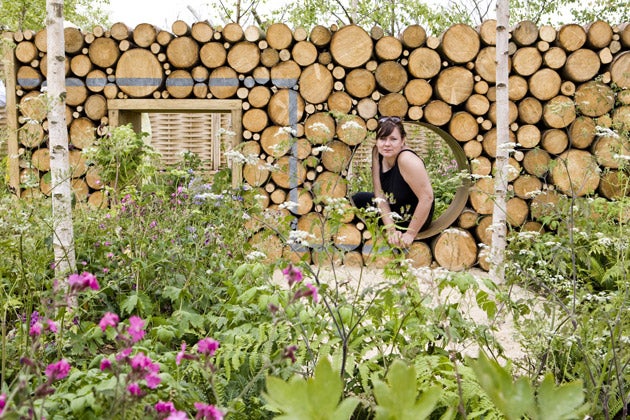Crawling with great ideas: The 'future garden' festival focuses on conservation and insect-friendly innovation

Your support helps us to tell the story
From reproductive rights to climate change to Big Tech, The Independent is on the ground when the story is developing. Whether it's investigating the financials of Elon Musk's pro-Trump PAC or producing our latest documentary, 'The A Word', which shines a light on the American women fighting for reproductive rights, we know how important it is to parse out the facts from the messaging.
At such a critical moment in US history, we need reporters on the ground. Your donation allows us to keep sending journalists to speak to both sides of the story.
The Independent is trusted by Americans across the entire political spectrum. And unlike many other quality news outlets, we choose not to lock Americans out of our reporting and analysis with paywalls. We believe quality journalism should be available to everyone, paid for by those who can afford it.
Your support makes all the difference."When I was a kid, growing up in wartime London," says David Bellamy, "there were butterflies everywhere." Clouds of African butterflies have been back in Britain this May, reminding us of what we have lost. Several million Painted Ladies dropped in from Morocco for a summer stint in our green and pleasant gardens, providing a tantalising glimpse of the riches of the past.
Yet it might be a glimpse of the future, too. Bellamy is in St Albans for the opening of Future Gardens, the first stage in a project called Butterfly World. Bellamy introduces Clive Farrell, the conservationist behind the scheme, who hopes to build a 200m dome on the site, full of Mayan ruins, tropical butterflies and rainforest, to open next year.
While the dome is under construction, Farrell is hosting a three-year garden festival exploring the funkier end of the show-garden world. With no sponsors or their interfering agendas, and a budget coming from the festival itself, the designers can give free rein to their imagination. Twelve plans were picked from hundreds of entries, the gardeners receiving £25,000 each to create something special. The first 12 will be open until 4 October, and in this conservation-focused setting, lots are looking at making the garden a greener place to be.
Native flower plantings and chestnut-shell mulch are just two of the insect-friendly ideas on offer. But for me, one of the biggest problems in the greener garden is the creation of boundaries. It's a conundrum that a number of designers here are tackling. In Jane Hudson and Erik de Maeijer's "Nest", a woven willow wall was created by professional weaver Peter Dibble. Working from his Norfolk headquarters, he used coppiced branches from the nearby Rothamsted Institute, famous for its willow collection. Unlike the cheap woven fence panels sold widely, Dibble's doubled structure is substantial and blocks out any prying eyes, giving the sense of nested security the designers were seeking.
Nearby, two recent graduates of Falmouth's increasingly prestigious garden-design course, Maren Hallenga and Hugo Bugg, have bisected the whole space with a glorious log wall, rusty mild steel circles making porthole views through it. The effect is delicious, both to my eye and hopefully to a whole range of invertebrates that'll make their home in the wall over time. Birch trees create dappled sunshine, ponds full of old cutlery shimmer in the summer light, and bees buzz, settling in already. As a vision of a greener future, it's very tempting.
For more details: www.futuregardens.org
Get the Look: Boundaries for all budgets
Treat yourself
A doubled bespoke woven-willow wall from Peter Dibble costs from £130 per metre (07855 288 770). Hallenga & Bugg timber log wall with steel viewing holes, price on application ( www.hblandscapedesign.com)
Cheaper options
6ft by 6ft woven willow panels from £70 ( www.musgrovewillows.co.uk). A cubic metre of wood for about £150 will make a substantial garden feature. Find a local retailer at www.certainlywood.co.uk
Do it yourself
Weave your own willow features with Ellen Musgrove at Musgrove Willows, from £45 for a day's course. A single bag of chopped logs piled into an elegant pyramid will provide a home for insects, and shelter and food for frogs and toads (£5.99, any petrol station)
Join our commenting forum
Join thought-provoking conversations, follow other Independent readers and see their replies
Comments